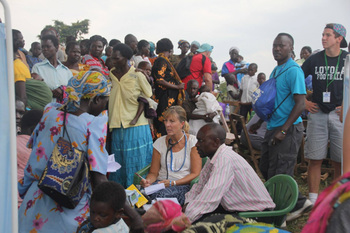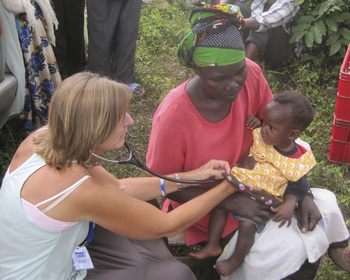
A Parish Priest Battles Poverty in Peru
When Rev. Joseph Uhen ’80 makes the rounds in his diocese of Piura, Peru, he savors the impact that he and his team have made in the lives of so many needy people.
Families who once went hungry have food on their tables. Drug addicts who received treatment have turned their lives around and now work for the Church. And farmers who almost lost their land now have the money and knowledge they need to support themselves.
These changes have unfolded in the two decades since Father Uhen arrived and began working to help the city’s neediest people, a vocation he uncovered during his time as a student at Notre Dame.
“It’s been a privilege living here that God has given me this kind of life,” Father Uhen says. “And it was something that took root at Notre Dame. I’m very grateful to ND for that experience.”
Discovering a Mission to Serve the Poor
Father Uhen’s vocation was a natural choice after his undergraduate experience at Notre Dame, where he absorbed the importance of faith and service. After starting out as a Business major, he switched to Psychology. He knew he wanted to help people, and he credits Notre Dame’s environment with preparing him for service work.
“What a great education, what a great place of faith, and also a great place to open our eyes to the other peoples of the world who don’t have the same opportunities, who live in underdeveloped circumstances,” Father Uhen says.
Rev. Theodore Hesburgh, C.S.C., was a strong influence on him.
“Father Hesburgh was very close to us and would talk to us and speak from the heart,” he says. “So that was very powerful. I know the Lord used him to help me see a lot of things. I remember in a Mass toward end of senior year, Father Ted said to appreciate what you have. He told us that while about 20 percent of the world’s population enjoys 80 percent of its resources, 80 percent of its population enjoys only 20 percent of its resources.”
Father Uhen also drew inspiration from prominent Catholics who worked to alleviate poverty. During his senior year, Mother Teresa won a Nobel Prize for her work on behalf of the poor in Calcutta, India, and Archbishop Óscar Romero of El Salvador, a social justice advocate, was assassinated.
“My mission was pretty clear,” Father Uhen says. “I should dedicate my life to serving others, especially the poor—and if possible, the poor in an underdeveloped country.”
The next decade saw him further develop this passion. After graduating, he first worked at the University of Portland, where he helped connect students with the poor. Later, he spent three years in Oklahoma helping a parish tackle pastoral problems. During a three-month stint in Mexico, he learned Spanish and experienced another culture. Then, in 1985, he volunteered with the Missionary of Charity sisters in the South Bronx, where he saw the power a priest could have in helping the poor. He studied to be a priest, came to Peru in 1993, and was ordained two years later.
Making a Difference
When he arrived in Peru, Father Uhen was touched by the strong faith he witnessed amidst staggering poverty.
“People lived in bamboo homes with dirt floors working odd jobs. Grown men were weeping because they hadn’t fed their kids for the past two days,” he says. “To see people of faith struggling with their needs was very powerful. I was seeing right before my eyes that suffering and that reality—and the need to do something about it.”

Father Uhen quickly got to work to help tackle the systemic poverty with programs that targeted specific needs. He now leads a team of about 30 employees—lawyers, doctors, nurses, social workers, and therapists—who help the Church deliver a variety of services.
“We’ve been able to put together a team as a parish that can help serve the entire city,” he says. “That kind of stability has allowed these programs over 22 years to develop into what they are now.”
Hunger is a pressing problem, so the team started a family-to-family food program that allows donor families to help feed Piura’s hungriest for $25 a month. Donors receive letters and photos from the families they help, and about 1,750 local families currently benefit, Father Uhen says. “Really, it’s a relationship of hope. Prayers are being answered.”
Domestic violence is all too common, so Father Uhen and his team built refuge for victims. Drug addiction is widespread, so they created a drug rehab center that serves up to 20 men at a time—most of them recovering from crack cocaine addiction. Graduates of the program have gone on to work for the diocese.
The team also operates a hospice, complete with 24-hour nursing care, and they built a school in a poor neighborhood that serves 900 students. A year ago, the team started a trade school that aims to give people much-needed job training.

In addition, Father Uhen has spearheaded a program to help farmers in the area. Decades ago, a well-intentioned government program redistributed more than 20 million acres to Peru’s poor, many of whom lacked the money and management savvy to run their own farms. The program Father Uhen runs has raised some $300,000 for education and for micro-loans that allow farmers to buy seed. So far, it has helped more than 250 farmers keep their land and begin to make a sustainable living.
Father Uhen is quick to credit God and his fellow team members for crafting solutions that have made a tangible difference in people’s lives.
“We can really thank the Holy Spirit,” he says. “Really, everyone has continued to help form this team.”
Connecting Campus and the Community
Father Uhen and his team haven’t done their work alone. Over the years, he has invited countless friends and acquaintances to do service work in Piura. A former Notre Dame roommate who works as an urologist sees patients during his visits. Other doctors have performed hernia surgeries and removed cataracts, and volunteers have helped distribute food.
“Many friends and Notre Dame students and alumni have come here,” Uhen says. “A nice bridge has been formed between the area and people interested in helping. Now we have over 700 visitors a year come down from North America. They’re very generous with their time, talents, and treasure.”
Father Uhen nourishes these connections during his annual visits to parishes in Milwaukee, his hometown, and in Oklahoma, where he worked before coming to Peru. And he shares details about his work with Notre Dame classmates when he visits for his class Reunion or the occasional football game.
He sees his work, and his ability to build connections between Notre Dame’s campus and Piura, as a blessing.
“I just came down here to be a good Catholic pastor in a diocese in which many of the people are struggling with poverty and want a chance to develop their own vocations,” he says. “Poverty is an evil that can make it very difficult for people to develop their gifts. And that causes another form of suffering. How painful to know that ‘I could do that, I believe that God has given me the potential, I just don’t have the circumstances.’ So it’s exciting to try and provide some of that and to see people grow and develop.”


